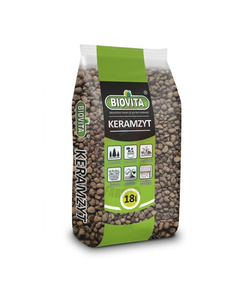- Garden expanded clay can be used in all types of gardens and flower beds. It is perfect both as a decoration of the ground surface in pots and other decorations, and as a drainage layer.
Gardening expanded clay, a product of natural origin, is ideal in the garden as an ornament on flower beds, flower beds and pots, as well as a drainage layer, because it perfectly retains moisture. Expanded clay is an economical, ecological and aesthetic product that provides plants with comfortable conditions for growth and development.
Expanded clay is fired at 1150 degrees Celsius, made of clay clay, lightweight construction aggregate. The resulting product has a high water vapor and moisture permeability coefficient. It is a great mulching material, replacing the bark, because it does not degrade, and above all, it is resistant to the formation of mold and fungi. The product is completely indifferent to rodents, so it will remain completely intact. Expanded clay is chemically neutral, does not acidify the substrate on which it is located, and is completely safe for plants.
In gardening, expanded clay is also used in hydroponic (water) crops that do not require a substrate. Expanded clay is also often found in the cultivation of insectivorous plants.
Due to the natural origin of expanded clay, there may be slight differences in color and shape between individual batches.
Why is it worth buying the product?
- does not change the pH of the substrate
- great for drainage
- reducing fluctuations in temperature and substrate humidity
- of natural origin
Application:
Expanded clay can be used interchangeably with bark as a decorative element, mulching on flowerbeds, flower beds and in pots. Expanded clay has drainage properties.





